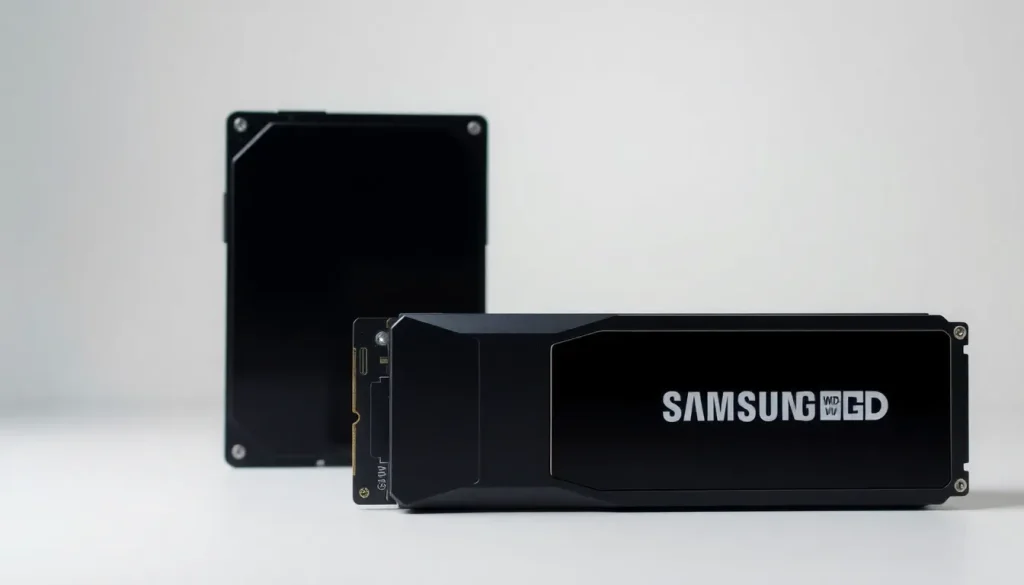WD Black SN770 compared to Samsung 990 EVO Plus

Choosing the right SSD can significantly enhance your computing experience, especially for gaming and professional workloads. In this detailed comparison, we will explore the differences and similarities between two popular mid-range NVMe drives: the WD Black SN770 and the Samsung 990 EVO Plus. Whether you are a gamer, a content creator, or simply looking to upgrade your storage, understanding these products will help you make an informed decision.
Both SSDs operate on the PCIe Gen 4.0 x4 interface, but the Samsung 990 EVO Plus also supports Gen 5.0 x2 (half of Gen 5.0), allowing it to utilize two lanes effectively. This flexibility can impact performance, but both drives offer commendable speed and efficiency. Let’s dive deeper into their specifications and performance metrics.
Comparative Overview of Theoretical Specifications
When evaluating the theoretical specifications of the WD Black SN770 and the Samsung 990 EVO Plus, it’s clear each drive has its strengths. The SN770 is available in lower capacity options of 250GB and 500GB, which may appeal to budget-conscious users. However, those looking for higher capacity will appreciate the 4TB variant offered by the 990 EVO Plus.
In terms of read and write speeds, the Samsung 990 EVO Plus generally outperforms the SN770 in both sequential and random performance metrics. This advantage is crucial for users who require high-speed data access and transfer rates.
Benchmark Scores Analysis
To provide a clearer picture of how these SSDs stack up in real-world performance, let’s examine their benchmark scores, specifically focusing on the 2TB variants.
PCMark 10 Full Drive Benchmark
This benchmark measures everyday tasks such as app loading, photo and video editing, and file management, mimicking real-world usage scenarios. The results show:
- Samsung 990 EVO Plus: 4,514 points
- WD Black SN770: 3,962 points
The EVO Plus leads by 552 points, which is approximately 13.9% better performance. Additionally, it records a higher bandwidth of 719 MB/s compared to the SN770’s 689 MB/s, indicating a slight but significant advantage in overall data transfer speed.
3DMark Storage Test for Gamers
This benchmark assesses the SSD's capabilities related to gaming tasks, such as game installation and loading. Here, the results are as follows:
- Samsung 990 EVO Plus: 4,753 points
- WD Black SN770: 3,516 points
The EVO Plus outperforms the SN770 by a substantial 1,237 points, illustrating a 35.2% advantage. The bandwidth results reflect this trend with the Samsung delivering 818 MB/s against the WD’s 556 MB/s. This performance disparity highlights the Samsung drive's efficiency in gaming scenarios.
CrystalDiskMark Sequential Read/Write Performance
This test evaluates how quickly each SSD can handle large, continuous files. The Samsung 990 EVO Plus consistently shows superior results:
- 1MB QD8 Read Speed: 7,153 MB/s (EVO Plus) vs 5,224 MB/s (SN770)
- 1MB QD8 Write Speed: 5,917 MB/s (EVO Plus) vs 4,871 MB/s (SN770)
Although the WD Black SN770 exhibits slightly better performance in low-queue workloads, the Samsung SSD excels in heavy, multi-queue tasks, making it the better choice for intensive applications.
CrystalDiskMark Random Read/Write Performance
For random read and write operations, which reflect typical everyday data requests, the Samsung 990 EVO Plus again outshines the SN770:
- 4KB QD1 Read Speed: 23,221 IOPS (EVO Plus) vs 19,929 IOPS (SN770)
- 4KB QD256 Read Speed: 1,020,985 IOPS (EVO Plus) vs 633,499 IOPS (SN770)
The EVO Plus demonstrates a significant advantage in multitasking and handling random workloads, making it more suitable for users who frequently manage multiple applications simultaneously.
File Transfer Rates
In practical file transfer tests, the Samsung 990 EVO Plus maintains a consistent lead:
- 50GB file copy speed: 1,541 MB/s (EVO Plus) vs 1,482 MB/s (SN770)
- Read speed for a 6.5GB zip file: 3,987 MB/s (EVO Plus) vs 3,367 MB/s (SN770)
This performance advantage suggests that Samsung's controller and caching mechanisms are more adept at handling both sustained and compressed data, providing an overall better user experience.
Power Consumption and Efficiency
When considering power consumption, the Samsung 990 EVO Plus is more efficient, achieving:
- Throughput per watt: 524 MB/s (EVO Plus) vs 445 MB/s (SN770)
- Average power draw: 3 W for both, but with better efficiency in data transfer for Samsung.
This efficiency could be especially relevant for laptop users or those with power management considerations, as it means longer battery life during intensive tasks.
Durability and Warranty Considerations
Examining the durability metrics of both drives, we find:
- TBW (Total Bytes Written) and DWPD (Drive Writes Per Day): Identical across both variants.
- Mean Time Between Failures (MTBF): SN770: 1.8 million hours vs. EVO Plus: 1.5 million hours.
- Warranty: Both drives come with a 5-year warranty.
The slightly higher MTBF of the SN770 may appeal to some users, suggesting a longer lifespan under typical usage conditions, but both SSDs are backed by a solid warranty.
Technical Specifications Breakdown
Analyzing the technical specifications, the Samsung 990 EVO Plus exhibits advanced features:
- Controller: Piccolo (5 nm ARM Cortex-R8) vs. Polaris MP16+ (16 nm)
- Flash Memory: V-NAND V8 (2,400 MT/s) vs. Kioxia BiCS5 (1,200 MT/s)
- Encryption: AES-256 and TCG Opal support in EVO Plus, absent in SN770.
The advanced architecture of the EVO Plus allows for better performance and data security, making it a more appealing choice for professionals and those concerned with data protection.
Pricing Insights
As of the latest updates, the pricing for these SSDs is as follows:
- 1TB WD Black SN770: $75.99
- 1TB Samsung 990 EVO Plus: $84.99
This indicates a roughly $10 difference for the 1TB variants. At the 2TB level, the price gap narrows to about $2, making the SN770 slightly more affordable in smaller sizes, but the added features of the EVO Plus often justify its higher cost.
Choosing the Right SSD for Your Needs
In summary, the Samsung 990 EVO Plus stands out as the superior SSD due to its advanced NAND technology, efficient controller, and encryption capabilities. It excels in gaming and high-performance tasks, making it the ideal choice for professionals and enthusiasts alike.
While the WD Black SN770 offers a compelling value, particularly in its lower-capacity variants, it generally falls short in performance compared to the EVO Plus. Users should consider their specific needs and budgets, but investing in the Samsung 990 EVO Plus often translates to better long-term value.
For a visual comparison of these two SSDs, check out this insightful video:




Leave a Reply